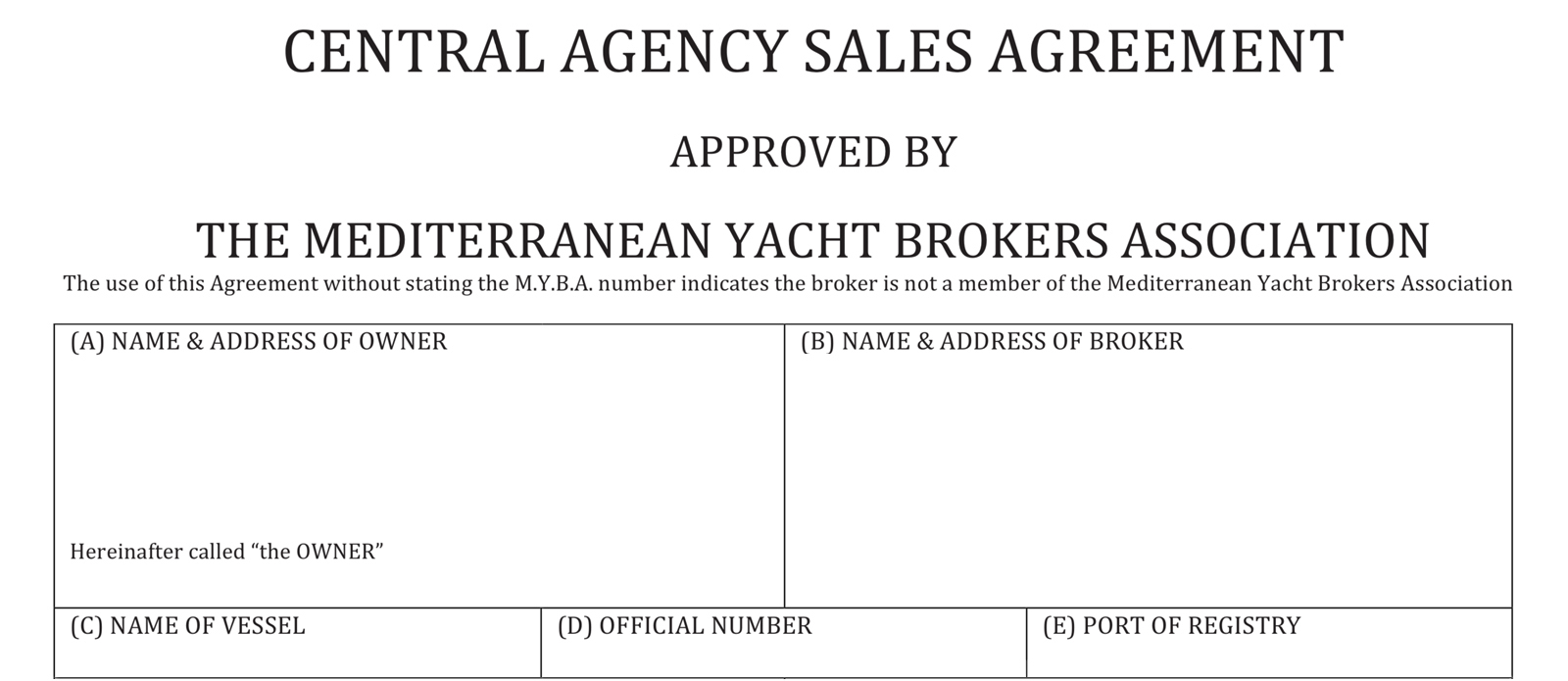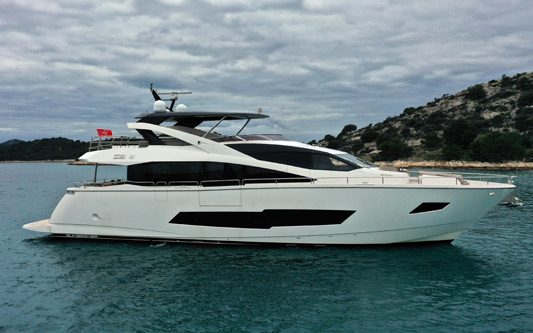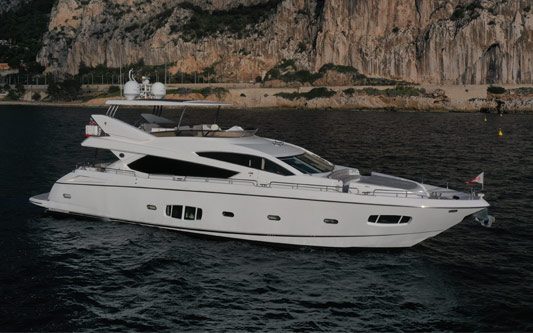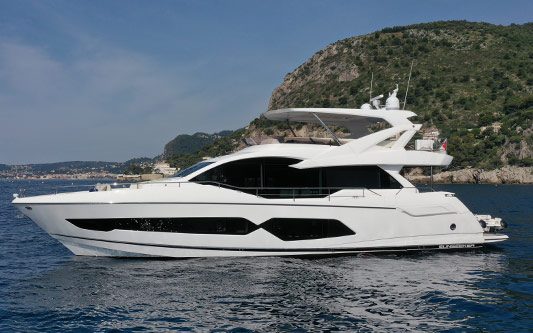THE CENTRAL AGENT
Brokerage - January 2, 2018Here at Bristow-Holmes our team have decades of experience, we’ve seen trends and debates come and go, but one thing that has been argued continuously through the years is the notion of “The Central Agent”.
“Central Agent” Definition: Central Agreement is an agreement between an owner of a vessel and an intermediary stating that the owner will not sell the vessel to any person other than the person brought by the intermediary. A person entering into an exclusive agreement cannot sell his/her vessel to other persons during the period of contract.
The negativity towards “The Central Agent” stems from clients giving their trust and enlisting “the wrong brokerage house” to act as the “Central Agent” when selling their yacht. We’ve seen it time and time again, where clients feel let down and disappointed at the way a brokerage house has shown lack of effort and productiveness in the attempted sale of their vessel. As we stated earlier this is simply due to choosing the wrong “Central Agent”. Yachts vary not only size, but style, age and most importantly their customer. Brokerage houses typically become known for selling a particular genre or brand of yacht and therefore having a client base which represents this. An example of this would be a client trying to sell his 40m Tri-Deck Yacht and enlisting one of the big four who are reputed for selling classic super yachts. These big houses use a systematic approach for promoting and selling boats. Irrespective of their style, age and size all vessels are processed in the following manner..
Brokers receives information -> broker gives information to listing department -> listing department does 4 key things,
- Adds Yacht to their website / company database
- Sends details to database of worldwide brokers
- Puts vessel on third party yachting website,
- Potentially organize a broker open day (inviting other brokers to view the vessel)
Although this may seem like a large amount of activity undertaken, realistically this is a systematic approach which applies to all vessels they list. One thing that is immediately apparent is the lack of input by the Broker themselves. Due to the hierarchal system of such organizations a bespoke and targeted approach to each vessel is simply not an option. From a Brokerage House’s viewpoint, a Broker generates revenue by selling yachts, paperwork and marketing is ultimately left to another individual with no hands-on experience of your vessel so a Broker can focus on what he/she does best.
A common argument is the size and reach of a Brokerage House due to the number of Brokers under the “corporate umbrella”. However, this couldn’t be further from the truth. A Brokerage House is a collection of individuals focused on their own clients. The perceived collaborative effort of all the Brokers under the same “umbrella” is ultimately a myth. Commissions are split on an “industry standard” level irrespective of whether the vessel is listed and sold by the same “House”. After all, if you can sell a yacht that is For Sale with another House you not only generate the same revenue but you don’t deplete your own supply!
The client base is something that is up for debate, the likelihood of a brokerage house having the right client base for your boat is extremely unlikely. Only “3% of boats sold are sold to a client known to the listing broker at the point of marketing the vessel for sale.” Therefore, the way to sell is by actively looking for a buyer and not by the above method used by the big 4 Brokerage Houses. “At the end of the day the physical sales process of a yacht is no different whether its 20m or 60m in length. However, the fundamental approach to marketing and finding a prospective purchaser is vastly different and affects how and when the vessel is sold” (Nigel Bristow)
Client/Buyer Perception can be an important issue, after all, if you were looking for a 40 Metre yacht would you approach a Brokerage House with a reputation for selling vessels over 60 Metre’s in length? All Brokerage houses focus and specialize in certain sizes and types of vessels. Those that tell you they can sell anything are simply misleading you. Remember that systematic approach we were talking about before? How can the same method work for a 60 Metre Yacht vs a 35 Metre production line vessel?
The systematic approach can ultimately dishearten the seller after they’ve trusted the brokerage house with a “Central Agreement”. The negative connotations towards the notion of a “Central Agent” are inevitable, “it didn’t work with the last one, why would it work with you.” Nobody wants the lack of effort from one party to effect the industry as a whole. So rather than telling you how fantastic a Central Appointed Agent can be its better to explain the Disadvantages of “Going It Alone”.
Reduced Sales Price
When you refuse to appoint a “Central Agent”, it allows the ability for all brokers to market your yacht “For Sale”. This may seem like a positive, however what ultimately happens is the industry/buyers wrongly assume that these are multiple “XYZ” for sale. Twenty “XYZ” yachts for sale with similar specifications leads to the perception of inflated supply and subsequently enforces the Buyers Viewpoint “room for drastic negotiation” and a reduced sales price.
Multiple Listings Confusing Potential Buyers.
There really is nothing more confusing than seeing what seems like the same yacht, same images, same specifications being listed by multiple brokers. Does this boat exist? Is this broker fishing? Which is the best company to deal with? Why do so many people have it for sale? all questions which are avoided by having a “Central Agent”.
Insurance Risk
Wonderful, you’ve noticed several brokers are now listing your yacht and have been told two are flying over to see it. Fast forward a few days and you’ve discovered that a potential client has cancelled his business trip and flown 8 hours in economy to view the boat. You are now being told the client has found out not only does it not have stabilizers but it’s also not in class (both of which were shown on the brokers listing). Not only does the client most certainly not want to purchase the boat but he has decided to sue you for misrepresentation of the vessel and subsequently loss of his time where he could have been making money.
What happened in this example was a classic case of Chinese Whispers, with so many different brokers trying to sell your yacht the true specifications of the yacht have been chopped and changed. It happens, people make mistakes but now you’ve got a bigger problem, a court case. We can’t stress enough how important having a “Central Agent” is, just for the mere security of the brokerage house having insurance for cases like this but more importantly insurance in case there are any accidents on board whilst showing a client round.
Apparent Desperation of The Seller
Because so many people have your yacht for sale you come across to buyers and brokers as being desperate to sell your yacht. This creates questions for the buyer, is there something wrong with it? Has it been looked after properly? Why so many brokers?
Buyer Playing Brokers Against Each Other.
You have a potential buyer but they are discussing the purchase with two different brokers. Not the end of the world, right? I suppose not if you don’t mind getting less than expected for your yacht. Two brokers are a buyer’s ideal situation they can now play the brokers against each other to get the lowest price possible. Remember these brokers are desperate for a sale, they’ve spent 2 months convincing this buyer that your vessel is the correct one and they sure aren’t going to let him buy your boat through another broker without a fight.
Legal Ramifications for The Seller.
So, you’re not interested in a “Central Agent” but you’ve come around to signing a “non-exclusive” agreement (open listing). The broker involved (Broker 1) has introduced his client (the potential buyer) as per the “non-exclusive” agreement. A month goes by and another broker (Broker 2) has come forward with a client who is also interested. “Broker 2” registers his name with a similar style agreement. This agreement means no other broker can bring that named client to view the vessel. “Broker 1” gets there first and manages to complete the sale of your yacht with his registered client who has bought the boat through a corporate structure. Money has been received, documents exchange and title has been passed. 2 months go by and you receive a call from “Broker 2” who is angry at why you allowed “Broker 1” to sell your yacht to the client he registered with you.
What happened!! Well it turns out both brokers registered the same person. The buyer told “Broker 1” his name was “John Doe” whilst telling “Broker 2” his name was “Fred Bun”. So who is at fault? turns out its you and “Broker 2” is suing you for breaking your non-exclusive agreement. You sold the vessel to a company, turns out that company is owned and operated by “Fred Bun” (The client registered by Broker 2). You didn’t realize this when you signed the contract but it’s too late now and “Broker 2” is going to successfully sue you for his commission.
No Effort from Brokers
Why would you expect there to be effort? You didn’t trust a brokerage house so why should they put their effort into selling your boat. At the end of the day you’re one boat in a big ocean and a broker is much better putting their efforts into selling a yacht which they are “Central Agent” on. Sure, the broker may put some effort in during the first few weeks but when that doesn’t bring about results why spend money promoting a vessel that could be sold at any time by another broker and therefore for no return. Ultimately a broker is like any salesman, they must believe and have faith in what they are selling to be able to gain the trust and confidence of a buyer. If a seller does not have the confidence to appoint the broker as the “Central Agent” how can the broker have the confidence in the seller.
It’s not easy knowing what to do when selling your yacht, but hopefully from the above you can see just how detrimental not appointing a “Central Agent” can be. Don’t let your previous experiences cloud your future decisions. Keep an eye out for our upcoming article on which Brokerage house is best for your yacht. Or if in doubt speak to multiple brokers, because the fact is the one you like the buyers will too.









